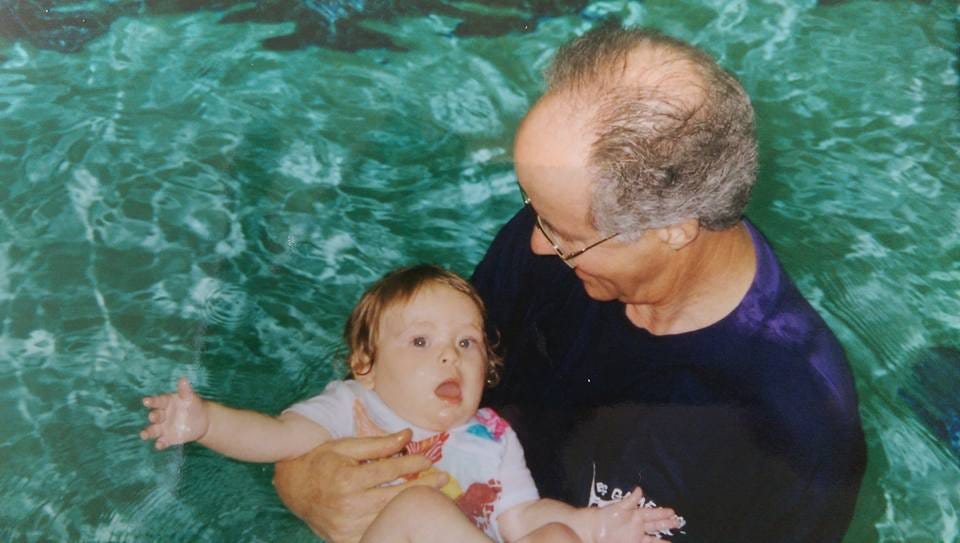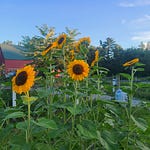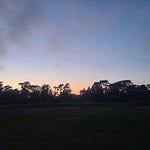content warning: cancer, death
I saw in someone’s Instagram story that humpback whales are actually doing okay, and my first thought was oh thank god! I have to tell my grandpa!
Then I remembered — my Grandpa Chickie is dead, so I can’t tell him, at least not in the traditional sense.
Grandpa Chickie and his wife Chrissie wrote this book for kids together called Humphrey: The Wayward Whale, published in 1986, and that’s why I thought of him. When I picture it in my mind’s eye, I feel warm, so I must’ve read it at some point growing up, though I don’t remember when. I remember that Humphrey was a kind of independent whale, doing his own thing, based on a real whale who deviated from his migration path and ended up in the San Francisco bay. I also remember learning that whales were endangered, which made me feel sad.
My grandpa’s motto was “go for it!”, which I knew because it was on his license plate. He wasn’t really the kind of guy you’d think would get a custom license plate — he was quiet and reserved in this way that made me think about how he grew up in Pennsylvania, a Quaker. He felt like an owl to me: wise, aloof, warmed by his own feathers, I want to pet it, but I’m not sure I’m allowed to get that close.
And yet, there it was, white metal with stenciled, navy letters: GOFRIT. I guess GOFORIT was too long or already taken, because I distinctly remember his license plate read gofrit. gofrit, I would say to myself, pronouncing the i as a long e, like a french fry in French, gofreeeeet. gofrit!
The last time I saw Grandpa Chickie was at an Indian restaurant in Berkeley in 2011, where my family was having dinner before I left for my gap year. It was his favorite restaurant. I remember him sick and happy at that meal. When we left the restaurant, I remember turning around on the sidewalk and watching him walk to his car, thinking, this might be the last time I see you. I was nervous and excited about going to Italy on my gap year; I was going for it, like he always encouraged me to.
The last project I remember my grandpa describing to me was a book in which a crotchety old man and a precocious young girl discuss the hopelessness and potential solutions for climate change. I don’t remember who was the hopeful one and who was the hopeless one. I believe this was going to be an illustrated book. I don’t think he finished writing it, I think this was what he was working on when he got cancer and when he died.
My grandpa’s smile was small, just the corners of his mouth curling up. I remember him smiling when he told me about this book. I remember him smiling when he showed me the obstacle course for squirrels he and Chrissie were building in their backyard; he looked uncharacteristically playful, his hands grazing wooden structures between citrus trees. I remember his face as mostly placid, occasionally visited by one of those small smiles or a subtle furrowing of his brow. My mom furrows her brow in the same way, though on her, it’s easier to notice.
My grandpa died in 2012, and I want to tell him that humpback whales were taken off of the endangered species list in 2016. I want to tell him that maybe his book was part of a larger movement that positively impacted the humpback whales.
I imagine telling him, I imagine a small smile. I imagine the conversation lulls to a natural conclusion, I imagine him going back to wherever he was, and after he dissolves into wherever, this weird warmth envelops me. I sigh. I can’t help but feel, it was good to see you, Grandpa Chickie. I’m so glad you know about the whales.
I imagine conversations with people who have died every now and then, mostly because I don’t see any reason not to. Of course, these conversations are surreal because really it’s me talking to me, through the lens of how I perceive that person. I was going to say through the lens of how I remember that person, but sometimes it’s people I’ve never even met: my dad’s dad, my mom’s mom. That’s not memory, is it?
I don’t know what my grandpa would make of Trump, of the fires, of the floods, of everything. It’s hard to imagine what he’d say. I don’t remember him ever getting emotional with me, and I can’t imagine discussing all that without emotions.
I imagine his smooth face, crows feet, the slightly furrowed brow. I imagine sitting at the redwood table in his home in Berkeley, even though now that redwood table is outside on my parents’ deck, and some other people live in that home in Berkeley. I love that table; it’s the cross-section of a redwood tree, and judging by the rings we all learned about growing up, it’s very old.
I imagine my grandpa writing. He was always writing something, imagining something, working on something, crafting something.
I remember a time around high school when he took me out to lunch in this neighborhood of San Francisco I had never seen or even heard of. It was this hidden little alley, shaped like a loop, that seemed to have been picked up out of Paris and dropped into northern California. I immediately felt like I was in a dream, a literary dream, which was fitting because we were meeting to discuss my manuscript. Yes, I had written a novel that was called, and I can’t stress this enough: Life According to Mindy Schwartz: A New Novel On the Wonders of Fashion, Friends, and King Arthur. I was very obsessed with and inspired by The Clique series, if anyone read those.
We sat at a table barely big enough for two, against the wall. I’m almost positive I was eating a croque madame sandwich, or something eggy, hammy and Frenchy. I’m almost positive he was eating a salad with arugula, and if he wasn’t, he was, you know what I mean? He had read my manuscript in advance. He found space on the table to place my pages next to the sandwich and the salad, and we talked through it. He asked me questions about my words and my world exploded — I was an author, a real author, thinking big questions, discussing them, sharpening, working to make this the best novel possible. I felt this joy bubbling up inside of me. I couldn’t wait to go home and get to work, but I also wanted this moment to go on forever: sitting in a magical bistro, across from my grandpa, talking about my art.
So, I like to think my grandpa knew I was a writer. But I still wish I could tell him: I’m a writer, it’s a really big part of who I am! I return to it daily and I can’t escape it! Isn’t that a weird feeling?
So, I’ll tell him. Why not? Here we go.
ANYA:
Hi Grandpa Chickie!
GRANDPA CHICKIE:
Hi, Anya.
ANYA:
So I wanted to tell you, I’m a writer.
GRANDPA CHICKIE:
That’s wonderful.
I’m not sure what to say/write next.
ANYA:
Do you remember when we went out to lunch at that French place in the hidden loop alley and we talked about my novel, about that girl Mindy Schwartz?
GRANDPA CHICKIE:
(smiling small)
Yes.
ANYA:
That novel was so bad, I really shouldn’t be calling it a novel, how in the hell did you get through that lunch with a straight face?
GRANDPA CHICKIE:
(chuckling)
Well, I have experience as an editor, so I leaned into that. I responded to what was there, on the page. It’s interesting, I don’t remember very much of what you wrote about, but I remember being impressed that you had presented me with a dossier of pages that you wanted feedback on. And that felt special, to have the opportunity to give my granddaughter feedback on her writing.
ANYA:
Special?
GRANDPA CHICKIE:
You’re right, I wouldn’t say special.
ANYA:
I don’t think so.
GRANDPA CHICKIE:
Maybe I would say: I appreciated the opportunity to have that conversation.
ANYA:
I appreciated it too.
GRANDPA CHICKIE:
Have you continued to work on that novel?
ANYA:
No.
GRANDPA CHICKIE:
I can’t say I’m too surprised.
ANYA:
It’s so bad. Also the girl in it is straight which is hilarious.
GRANDPA CHICKIE:
(brow furrowed ever so slightly)
?
ANYA:
Oh, right, this happened right after you died — I realized I’m gay. I’m actually married now, to my wife, Jess.
GRANDPA CHICKIE:
Oh!
ANYA:
She’s a writer, too, and she makes art out of loose parts, out of recycled things.
You guys, I didn’t have a chance to tell you yet that my grandpa was an avid recycler, before it was a common thing. He wrote a book about living cheaply and in style and was always reducing, reusing, recycling. He made this toilet with a beautiful wooden bowl for the sink, where the water you used to wash your hands then became the water in the toilet bowl!
GRANDPA CHICKIE:
She sounds lovely.
ANYA:
I really want to ask you — what was your relationship to writing? Did you feel compelled to do it? Did it make you as sad as it made you happy? Did you finish that book about the old man and the young girl talking about climate change? Was that about us? How did you feel about our relationship?
GRANDPA CHICKIE:
Those are all very interesting questions. You’ve given me a lot to think about.
ANYA:
You’re not going to answer them?
GRANDPA CHICKIE:
No.
ANYA:
Okay.
Grandpa Chickie takes my hands.
ANYA:
There’s one more thing I have to tell you!
GRANDPA CHICKIE:
What?
ANYA:
The humpback whales! They’re no longer endangered! There’s been increased sightings of them in the Pacific Northwest almost every year since 2011! Look at this article I was reading — it says: they are big, they are beautiful, and they are back!
Grandpa Chickie smiles bigger than I’ve ever seen in real life and begins to dissolve, the last thing to go are his hands, holding mine.
I always thought that “go for it” was my grandpa’s motto because his life embodied it. But recently I started to think that maybe it was his motto because it was what he needed to hear. So he put it all around him: on his license plate, in conversations with his granddaughter, all over, all so he wouldn't forget.
I guess I know what he’d say, after all: he’d say, go for it. gofrit!
My Grandpa Chickie — a.k.a. Ernest Callenbach — wrote several books, including Ecotopia, which became a sort of cult classic in the 1970’s. If you want to learn more about him, reach out to me! Or Google him. He was so cool.















Share this post